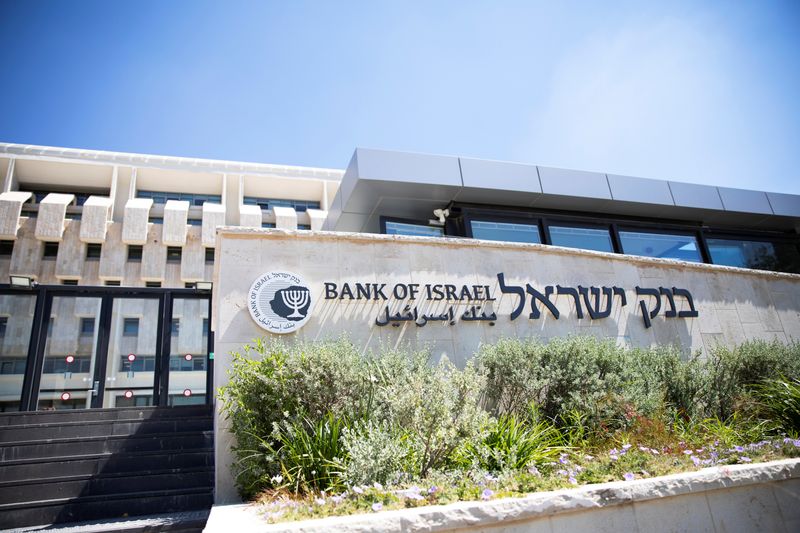By Steven Scheer
JERUSALEM (Reuters) - Israel's central bank is expected to leave short-term interest rates unchanged this week, as it did in July with inflation easing, but the rate hike cycle may not be over with the shekel hovering around a 3 1/2 year low.
Of the 16 economists polled by Reuters, 15 projected the Bank of Israel would hold its benchmark rate at 4.75% - its highest level since late 2006 - when it announces its decision on Monday at 4 p.m. (1300 GMT). One forecast a 25 basis point increase to 5.0%.
"The weaker shekel and political uncertainty will likely keep it cautious and skews risks to the upside - another 25 basis point hike," said Barclays economist Zalina Alborova.
Israel's annual inflation rate dropped to 3.3% in July from 4.2% in June, its lowest rate since March 2022 but above a government target range of 1-3%.
But the shekel, which has a pass-through effect on inflation of as much as 20%, weakened 4% further in August versus the dollar and stands at a 3.80 rate - its weakest level since March 2020.
The shekel has depreciated 8% so far in 2023 on the heels of plans by Prime Minister Benjamin Netanyahu's government to trim the powers of the country's Supreme Court as part of an overhaul of the judiciary. The plan has drawn wide public opposition, spooking foreign investors, pushing down capital inflows and raising the cost of imported goods.
"The central bank will leave the door open for further rate hikes and maintain its relatively hawkish stance, given that the shekel remains weak and exposed to domestic political developments," said Goldman Sachs economist Tadas Gedminas.
"However, the relatively dovish incoming inflation data raise the bar for how much FX developments would have to worsen to warrant additional rate hikes at this juncture."
Morgan Stanley's Georgi Deyanov said he changed his call to no move on Monday from a hike citing recent inflation data but gives a 40% chance of a further rate increase down the line.
In contrast, Citi believes that with inflation trending downward, the rate could dip below 3% this year and average 2.3% in 2024, with strategist Bhumika Gupta saying inflation prints the past two months have been lower than expected.
"A rate cut in the first quarter next year could be likely, however, growth remains robust and exceeding expectations, which could be a headwind," she said.

Israel's economy is expected to grow around 3% in 2023.
The Bank of Israel left its key rate unchanged in July after an aggressive rate hike cycle that took the rate from 0.1%. Minutes of the meeting showed policymakers were concerned the shekel could keep inflation from moving back to its target and that further rate increases were possible.